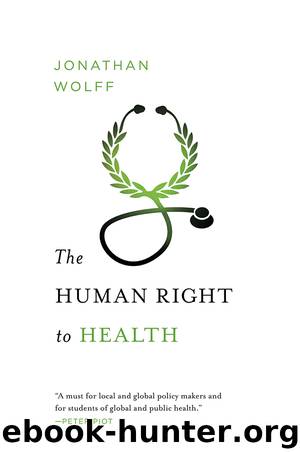The Human Right to Health (Norton Global Ethics Series) by Jonathan Wolff

Author:Jonathan Wolff
Language: eng, eng
Format: epub
Publisher: W. W. Norton & Company
Published: 2012-01-17T16:00:00+00:00
TRIPS AND THE PRICE OF MEDICINES
Human right to health activists often pay a great deal of attention to the underlying determinants of health and illness, such as poverty and illiteracy. Yet once people have become ill, a cure is needed. The WHO maintains a list of essential medicines that should be available in all countries. Millions of people die through lack of access to such medicines, even though most of the medicines on the list are not at all costly for governments and are off-patent so available in generic form. Lack of access to medicine is often, then, a problem of organization and infrastructure, not a problem of cost. Nevertheless, in a significant number of cases cost is a major problem—and it is more of a problem than it was two decades ago.
Prior to the 1990s, many developing countries did not recognize patents or copyrights that had been granted in other countries. In India, Brazil, and other large developing countries with industrial capability, it was standard practice to develop generic versions of pharmaceuticals that would otherwise have been available only at an unaffordable price. However, the World Trade Organization, the third Bretton Woods institution and the last to play a major role on the world stage, has attempted to bring in a level of harmonization of intellectual property. The main instrument by which this has been done is known as TRIPS—Trade Related Aspects of Intellectual Property Rights. (One might think that a more appropriate shortening of the name would have been TRAPS, but this would have given the game away.) TRIPS was negotiated in 1994. Membership of the WTO is seen as advantageous in gaining access to world markets, and TRIPS is binding on all members. The essence of TRIPS is that although there are various transitional exemptions, mostly expired now, the aim is to move to a world in which all countries respect international copyrights and patents. The agreement included a twenty-year patent period for new medicines, allowing the producer company a temporary monopoly during which it can set its own price without having to worry about competition. Countries cannot pick and choose which provisions to follow, and so while it may be beneficial to trade to be a member of the WTO, it provides a great challenge to countries that simply do not have the resources to purchase novel medicines at full price; they will be unable to meet their obligation to fulfill the right to health for their citizens. Arguably, then, all signatories of TRIPS have failed to protect the human right to health by allowing drug companies to charge unaffordable prices for essential medicines. Although TRIPS does allow for “compulsory licensing” of patented medicines in cases of national emergency, in practice this provision is rarely used.19 However, Brazil has managed to make low-cost, generic HIV treatments available, and a complaint against Brazil in 2001 from the USA to the WTO was withdrawn,20 most likely because of the likely world outrage if the USA had managed to make HIV treatment unaffordable in Brazil, leading to the early deaths of tens of thousands.
Download
This site does not store any files on its server. We only index and link to content provided by other sites. Please contact the content providers to delete copyright contents if any and email us, we'll remove relevant links or contents immediately.
| Civil Rights | Discrimination |
| General | Human Rights |
Day by Elie Wiesel(2775)
The Age of Genius by A. C. Grayling(2570)
Gideon's Spies: The Secret History of the Mossad by Gordon Thomas(2329)
The Gulag Archipelago (Vintage Classics) by Aleksandr Solzhenitsyn(2078)
FATWA: Hunted in America by Pamela Geller(1993)
Columbine by Dave Cullen(1858)
Men Explain Things to Me by Rebecca Solnit(1716)
The Rule of Law by Bingham Tom(1679)
Anatomy of Injustice by Raymond Bonner(1653)
Examples & Explanations: Administrative Law by William F. Funk & Richard H. Seamon(1631)
Three Cups of Tea by Greg Mortenson(1606)
The Source by James A. Michener(1598)
That Every Man Be Armed by Stephen P. Halbrook(1575)
ADHD on Trial by Michael Gordon(1568)
Future Design by Unknown(1562)
Gideon's Spies by Gordon Thomas(1497)
Palestinian Walks by Raja Shehadeh(1493)
Constitutional Theory by Carl Schmitt(1443)
Nothing to Envy by Barbara Demick(1436)
